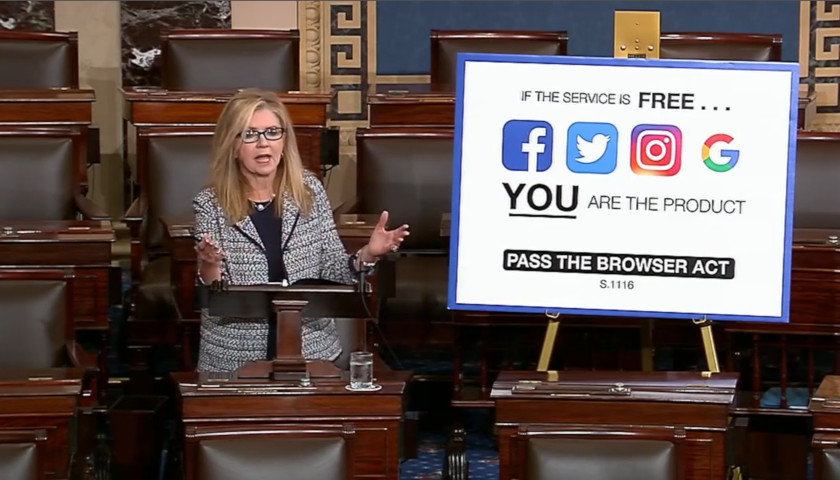U.S. Sen. Marsha Blackburn (R-TN) on Thursday spoke on the Senate floor asking for support for the bipartisan BROWSER Act and discussed the dangers of FaceApp ahead of the first Senate Judiciary Tech Task Force meeting she led that afternoon.
“A quick scroll through an average Instagram feed this morning revealed post after post of artificially-aged faces—all thanks to FaceApp, who now owns those images, and can do whatever they like with them,” Blackburn said in a press release. “Don’t mistake that recklessness for trust. Ask anyone who downloaded that app last night how they feel about it this afternoon.”
Video of her speech is available here.
Later in the day, Blackburn tweeted, “Thank you @LindseyGrahamSC for asking me to serve as Chair of the @senjudiciary Tech Task Force.”
Thank you @LindseyGrahamSC for asking me to serve as Chair of the @senjudiciary Tech Task Force. pic.twitter.com/PxtvZyvMsk
— Sen. Marsha Blackburn (@MarshaBlackburn) July 18, 2019
The free FaceApp allows users to make themselves look older in photos.
Business Insider reported on privacy concerns that have surfaced for the Russian-created app that has more than 12.7 million new users.
The terms of service allow the company to license photos for commercial purposes and store the pictures on its server even after the user deletes them from the app. U.S. Sen. Chuck Schumer (D-NY) asked the Federal Trade Commission to investigate FaceApp’s business practices, Business Insider said.
On July 17, FaceApp issued a statement claiming that the company does not retain user data and deletes “most images” within 48 hours. FaceApp said it does not sell user information or photos to other companies, though it does give data to ad services to place user-specific advertisements within the app.
The Tennessee Star in April reported on Blackburn introducing the BROWSER Act.
Blackburn called out media giants to use their power responsibly and to respect diverse viewpoints, particularly conservative voices.
Blackburn’s remarks as prepared follow:
Thank you, Madam President.
Today, I rise and seek my colleagues’ support for the BROWSER Act: an officially bipartisan piece of legislation that will protect consumers’ data privacy, and offer tech companies the freedom they need to innovate.
That innovation is what puts the words and wisdom of the entire world at our fingertips.
But now that we’ve downloaded the apps, and, in the process, handed over all of our personal information, we find ourselves in a pitched battle over ownership of the “Virtual You.”
Data is the bedrock of most tech companies’ revenue streams. The higher quality their data sets are, the more advertising revenue they collect.
There is a reason why companies provide convoluted, pages-long “privacy policies” in tiny print and call it “full disclosure.”
It’s the same reason watchdogs warn consumers, “If the service is free, you are the product.”
And as anyone who has followed the growing controversy over “Face App” knows, that product isn’t limited to bits of personal information appended to a data set.
It could be your image used publicly—with your consent, of course, if you agreed to the fine print by clicking “download.”
Consumers have gotten so used to a lack of transparency that they’ve become reckless.
A quick scroll through an average Instagram feed this morning revealed post after post of artificially-aged faces—all thanks to FaceApp, who now owns those images, and can do whatever they like with them.
Don’t mistake that recklessness for trust. Ask anyone who downloaded that app last night how they feel about it this afternoon.
Over the past few years we’ve watched tech companies lose control of their own narrative. For good reason, their customers feel invaded, and are demanding a more satisfying response to the current parade of controversy than a vague promise to do better.
It is clear that the tech industry can no longer regulate itself.
This is why I welcome my colleagues on both sides of the aisle to sign on to the BROWSER Act.
This bill is years in the making. I first introduced it in the House of Representatives, during the 115th Congress—but my work on the issue began well before that.
This legislation sets up a federal compliance framework tech companies can use as a guide.
It will require companies to secure a clear “opt-in” from consumers before collecting sensitive information about health, finances, or social security numbers.
For less sensitive information, like an IP address, companies will have to give their customers an “opt-out.”
Companies won’t be able to deny service to anyone refusing to waive their privacy, but the Federal Trade Commission will keep the playing field level by applying the rules equally, across the entire internet ecosystem.
But most importantly, the BROWSER Act resists the urge to overregulate an industry that thrives in an atmosphere of unbounded creativity.
Lately, though, blowback from very public mistakes has chased these companies into the arms of regulators, making them all too happy to accept government-mandated rules in lieu of internal standards.
Facebook recently made the news after the Federal Trade Commission slapped the company with a 5 billion dollar fine over evidence that surfaced regarding their mishandling of consumer data.
I say “slapped,” because 5 billion dollars is a slap on the wrist for a company as successful as Facebook.
We could soak Facebook for 100 billion dollars next time (and there will be a next time,) and it would do nothing to ensure that this type of exposure won’t happen again.
Their bad behavior won’t change unless we change the way they do business.
Understanding the business of Big Tech is half the battle. I’ve been at this for years, and I can tell you, the ins and outs of this industry are not something you can learn in a day.
If you think you know it all, you know just enough to be dangerous—and that’s no way to regulate.
I thank my colleague, Senate Judiciary Committee Chairman Lindsey Graham, for recognizing this need for institutional knowledge, and for asking me to lead the Committee’s new “Tech Task Force.”
This bipartisan group will meet regularly with leaders in the tech industry. We’ll be talking about data privacy, antitrust, competition, and other issues as they arise.
Our first meeting is later today, and I would encourage my friends in the Senate to use it as a resource and study up, because these issues aren’t going anywhere anytime soon.
To my colleagues who are skeptical about using a lighter touch to regulate Big Tech, I say this: Washington is bad at “culture change.”
We have no business asking consumers to trust tech companies. We’re not the experts.
But through the BROWSER Act, we can give industry a guide to prioritizing trust and transparency, and let tech companies be the ones to ask customers to come back to the table.
I yield the floor.
– – –
Jason M. Reynolds has more than 20 years’ experience as a journalist at outlets of all sizes.
Photo “Marsha Blackburn” by Marsha Blackburn.





